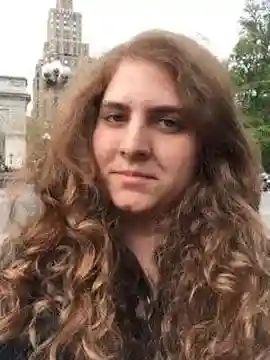Header image via T. Winstead
I’ve been staring at a blank page trying to start this article for 30 minutes now. Because how do I encapsulate the experience of a lifetime into a few hundred words? How do I break down all the learning and growing of the first semester of my MFA program into one column?
I’ll do my best.
I didn’t really believe, not until I was in the middle of the semester, that it was real. I tried to get my MA right after undergrad and that flopped; then I tried to get my MFA, from the same program I’m currently in (Vermont College of Fine Arts’ Writing for Children and Young Adults program), four years ago, and that flopped, too. So I just kind of signed up this time around and was like “yeah, we’ll see, lol.”
And then it happened, and it was real, and I was in the middle of packet work (every month, students turn in a packet of 25-50 pages of creative work, 10-12 pages of critical work, and like 8-12 books in a bibliography), and it was happening, and it still didn’t feel real!
This past semester, the one that lasted from January-June 2022, I turned in 198 pages of creative work, 34 pages of critical work, and read 36 books. Which is a lot of work! All this on top of job hunting and then finding a new job, and also trying to have a social life. But this article isn’t about jobs or social lives. This is about grad school, namely the big question: is it worth it?
Is the money spent, the time poured in, the impostor syndrome experienced worth it?
For me, that answer is a resounding yes.
Because what I got out of last semester was more than what I expected. See, I went into grad school looking for three things: to level up in my craft, to find a community, and to be able to eventually teach.
Last semester really brought my craft to the next level, just by forcing me to think about things like pacing and characterization while drafting, something I normally just kind of vibe about and pray for the best.
It also opened me up to a vibrant, welcoming community, one that has embraced me no matter what side of me I’m showing: the happy-go-lucky vibrant one, or the devastated sobbing one. The community held my hand through the celebration of getting a new job and the hardship of coming out. The community embraced me when I was bubbly and laughing and when I was depressed and filled with intrusive thoughts.
And one more thing happened last semester — I got validation that I’d been seeking for years.
See, right before applying for VCFA, I did a lot of things that ended in rejection: I queried two books; entered Pitch Wars to 0 requests; applied for a separate mentorship program I didn’t get; applied for three fellowships I didn’t get; and entered a contest I didn’t make it past the first round of. So I was feeling some type of way about my writing, about my existence and ability to claim to be a “writer.”
And my incredible faculty advisor, along with my classmates, boosted me in ways you cannot even imagine. They made me feel like I belonged (which makes sense given that the program hashtag is #youbelonghere), and they made me feel like I do have something to offer the world: my writing.
It was a reminder that I desperately needed to keep me going.
So even though the semester was intense, filled with hard work and long days of putting in school hours after the day job, even though it costs a lot of money, even though sometimes I thought maybe I didn’t belong — in the end, it’s all worth it for the reminders that I DO belong. And that’s priceless to me.

About the author
Karis Rogerson is a mid-20s aspiring author who lives in Brooklyn and works at a cafe—so totally that person they warn you about when you declare your English major. In addition to embracing the cliched nature of her life, she spends her days reading, binge-watching cop shows (Olivia Benson is her favorite character) and fangirling about all things literary, New York and selfie-related. You can find her other writing on her website and maybe someday you’ll be able to buy her novels.








